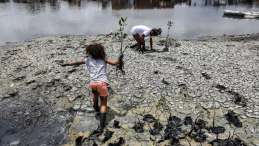China and Germany stressed the importance of international and multilateral cooperation to support the global economic recovery. Both sides clearly indicated that they have a wide range of cooperation areas in various fields such as climate change and green development. To provide complementary support for the advancement of third countries, Germany and China joined forces on the topic of disaster risk reduction to develop triangular cooperation modalities. Combining the technical know-how, expertise and funding of both countries aims to create optimal added value for third countries.
Together with partners in China, a plan for capacity building on disaster risk management for neighboring countries in Asia was initiated.In this regard, GIZ on behalf of BMZ is conducting pilot triangular projects on disaster risk reduction in cooperation with the Chinese Ministry of Emergency Management (MEM) and National Disaster Risk Reduction Center of China (NDRCC) in 2022. The goal is to support Cambodia and Mongolia to improve effective disaster mitigation, strengthen existing disaster prevention systems as well as build up risk resilience for SMEs. Additionally, the intervention will foster international cooperation to support the ability of lesser developed countries to systematically cushioning risks and build up a more resilient infrastructure. In Mongolia the main partner will be the National Emergency Management Authority (NEMA), in Cambodia the National Committee for Disaster Management (NCDM). A consulting team of German and Chinese experts should be engaged to implement the project.
The overarching objective of this assignment is to provide technical knowledge on disaster risk management for Mongolia and Cambodia. While having a similar approach and topics, the working scope differs slightly within each of the countries according to respective partner needs. The Scope of work will mainly be divided into two main parts, the first part includes one fact finding mission to the beneficiary countries (Cambodia and Mongolia) and deliver research and analysis reports and provide recommendations. The second part is to enhance capacity building on climate disaster/risk management via facilitating expert exchange, best practices sharing, and lesson learnt among Chinese stakeholders and participating countries.



